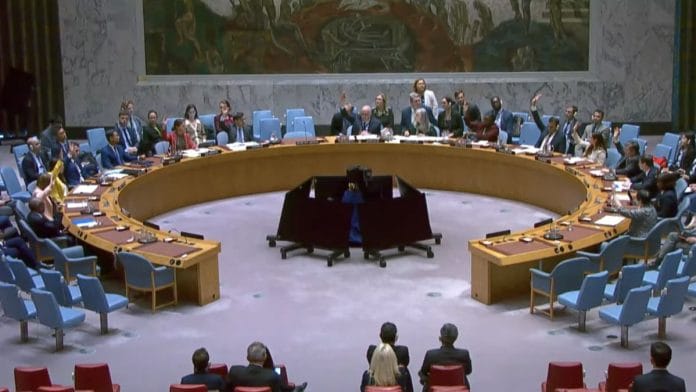New Delhi: Pakistan is likely to hold at least two open sessions at the United Nations Security Council (UNSC) in July, potentially raising Operation Sindoor and Jammu and Kashmir at the international forum, ThePrint has learnt.
Islamabad, is set to hold the rotational presidency of the UNSC for the month of July, after a gap of little more than 12 years. The South Asian nation became a member of the UNSC in January of this year for a 2-year term till 31 December, 2026 as a part of the 10 non-permanent members of the international body. Pakistan was previously a non-permanent member from 2012 to 2013.
A person familiar with the matter pointed out there is an expectation within the government that Islamabad will use its position on the UNSC—an organisation which India is currently not a member of—to internationalise South Asian issues, especially in the aftermath of Operation Sindoor.
As President of the Security Council, Pakistan has some power on deciding the agenda for the meetings of the Council. As per the rules of procedure, the provisional agenda for each meeting will be drawn up by the Secretary-General and subject to the approval of the President of the Security Council.
For India, its current diplomatic initiatives with the members of the UNSC, including calls between External Affairs Minister S. Jaishankar with his counterparts in the member-states of the Security Council after Operation Sindoor, are a part of its push to sensitise the nations of New Delhi’s reasons for carrying out the military operation. Operation Sindoor, which began on 7 May, targeted nine terrorist complexes within Pakistan, including Bahawalpur and Muridke.
Pakistan’s military escalated with strikes aimed at Indian military installations, which eventually led to 4 days of back-and-forth hostilities between the armed forces of the two nations. The two militaries eventually arrived at a bilateral understanding to stop all firing on 10 May.
In the last week, seven groups of Indian parliamentarians and ambassadors have departed for 33 nations, including 13 of UNSC’s total 15 members. The all-party delegations have been meeting with their counterparts in these countries, along with officials and members from the academic community, in an effort to raise India’s point of view directly with the concerned members.
The five permanent members of the UNSC are China, France, Russia, the UK and the US, while the current 10 non-permanent members include Algeria, Denmark, Greece, Guyana, Pakistan, Panama, the Republic of Korea, Sierra Leone, Slovenia and Somalia.
India’s delegations will not be travelling to Pakistan and China.
Foreign Secretary Vikram Misri also briefed the ambassadors and high commissioners of the UNSC member-states in the days following Operation Sindoor, further highlighting India’s stance on the matter.
The diplomatic push across different levels of government of the UNSC members and other countries will likely contribute to the national positions of the member-states of the Security Council, if Pakistan raises the issue at the international body.
Also read: Trade incentives averted India-Pakistan war—Team Trump’s claim in defence of tariffs in US court
Pakistan’s stance on Pahalgam attack at UNSC
On 25 April, the UNSC under the Presidency of France put out a statement condemning the terrorist attack in Jammu and Kashmir’s Pahalgam, which left 26 people dead. A few days later, Pakistan’s Deputy Prime Minister and Foreign Minister Ishaq Dar asserted in its National Assembly that Islamabad lobbied to remove references to The Resistance Front—a front for Lashkar-e-Taiba, which had originally claimed credit for the attack in Pahalgam—from the UNSC statement.
A week later, Pakistan pushed for a closed door discussion on the “India-Pakistan question” in the UNSC, where Islamabad was chastised for the “false-flag” theory behind the terrorist attack in Pahalgam and was quizzed about the involvement of Lashkar-e-Taiba in the attack, as reported by ThePrint.
Furthermore, Islamabad faced pushback from a number of UNSC members, which asked Pakistan to solve the issue bilaterally.
In its last presidency, in January 2013, Pakistan had held a session on the “Threats to international peace and security caused by terrorist acts”, which led to a statement by the President of the Security Council.
The discussion at the time happened days after bombings in Quetta, the capital of Balochistan, left at least 130 people dead on 10 January, 2013. India was one of the at least 50 representatives that made a statement at the day-long debate on international terrorism. At the time, India’s Permanent Representative to the United Nations was Hardeep Singh Puri.
After the day-long debate, Pakistan, as the President of the Security Council, had released a statement in which, the members of the international body reiterated “the obligation of Member States to refrain from providing any form of support, active or passive, to entities or persons involved in or associated with terrorist acts, including by suppressing recruitment of members of terrorist groups, consistent with international law, and eliminating the supply of weapons.”
(Edited by Zinnia Ray Chaudhuri)
Also read: As Op Sindoor began, India’s top military brass watched strikes unfold live from South Block







We know very well that The Print is a Pakistan Friendly Newspaper